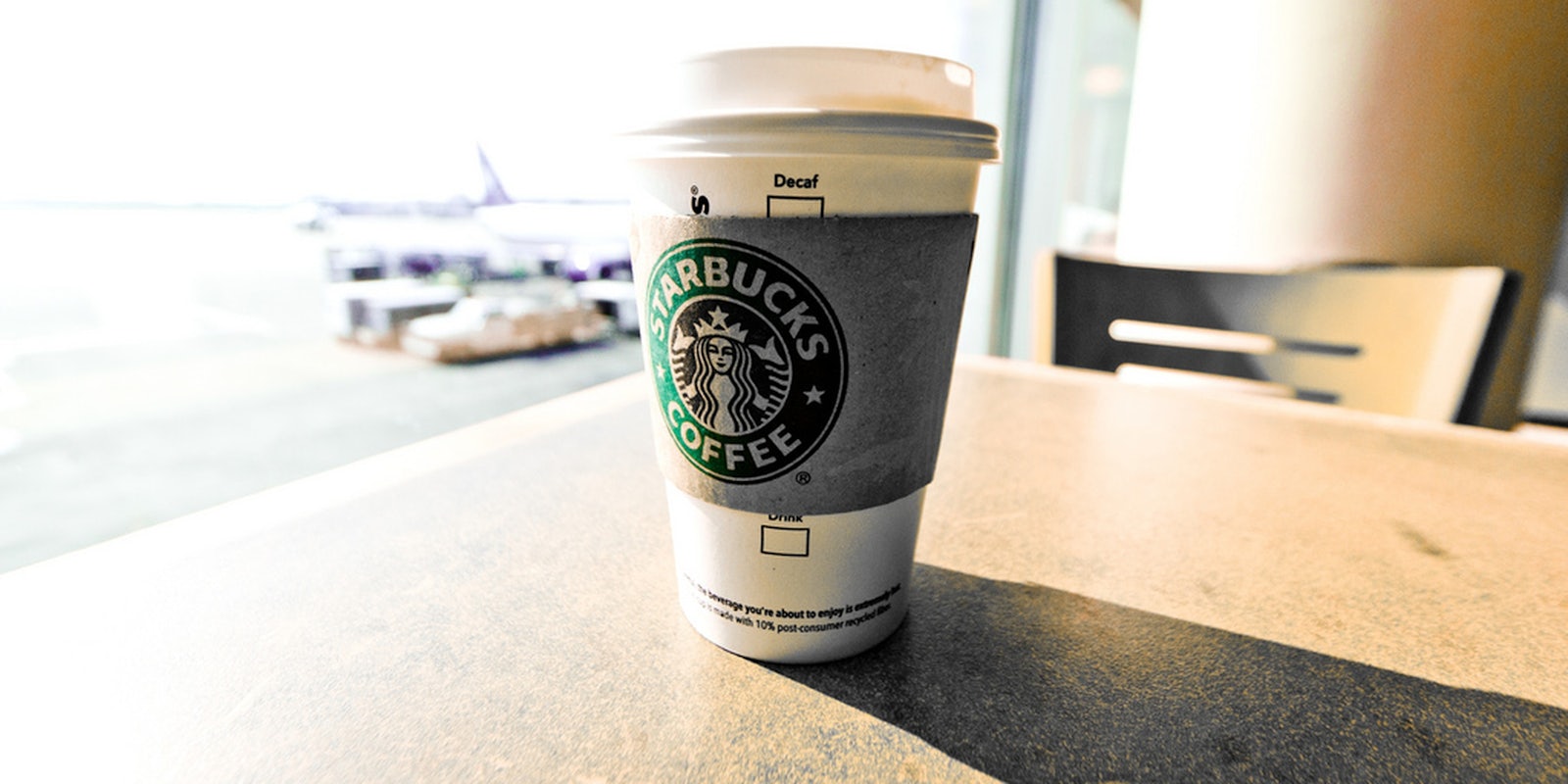Colorblindness with a little extra whip on top. That’s a liberal 21st century prescription for racial inequality in America if I’ve ever seen one.
Given their status as a bastion of white, middle-class homogeneity, it makes no sense that Starbucks has partnered with USA Today to create the “Race Together” initiative to help foster more conversations about race in America. According to Fortune, “Starbucks baristas will have the option as they serve customers to hand cups on which they’ve handwritten the words ‘Race Together’ and start a discussion about race.” But the problem is that their idea of conversation looks more like the sale of colorblindness over coffee, excluding the very voices who have already been working on issues of race in this country.
The initiative’s post-racial sentiment is reflected in the advertising for the campaign the company released this week. The full-page ad, which ran on Monday, simply shows the words, “Shall we overcome?”, a shameless co-opting of the rallying cry of marginalized black people in the United States and abroad. Another ad features the iconic Starbucks coffee cup scribbled with the words “#RaceTogether.” It then says, “When it comes to race we are all human,” instead of the usual size and flavor variations. The box for “human” is the one that’s checked because that’s what really counts, but the ads only use white hands to make this point.
To be clear, Starbucks is willing to talk about race as long as you agree that we’re all human first, above all else. Scholars Eduardo Bonilla-Silva and Tyrone A. Forman explain that half-hearted efforts like these at “talking” about race without wanting to really talk about its larger implications in American society are a form of “color-blind racism.” They describe it as a new “racetalk,” which “allows whites to appear ‘not racist’” and “preserve their privileged status” at the same time.
The inevitable backlash has already begun: On Tuesday, Starbucks’ SVP of Global Communications Corey DuBrowa remarked in a post on Medium that he deleted his Twitter account because he “felt personally attacked in a cascade of negativity.” Much of that negativity came from people of color who tweeted at DuBrowa, hoping to engage him on the very issues his company is trying to address. Most of them were promptly blocked. So, how exactly are baristas expected to embark upon these conversations with Starbucks patrons if executives aren’t even willing engage in them themselves?
According to the company’s website, the campaign began with “one voice”: the company’s (white male) CEO, Howard Schultz. He is quoted as saying: “We at Starbucks should be willing to talk about these issues in America. Not to point fingers or to place blame, and not because we have answers, but because staying silent is not who we are.” And he’s right. It’s not like Starbucks to stay silent on these issues. Accordingly, Schultz has a track record riddled with large-scale, socially-conscious programs, but sadly, they rarely work.
While the goal of stimulating conversation about race in America is admirable, black and white Americans aren’t even in agreement about how that conversation should look. Last year, Pew Research found that, just when racial tensions in Ferguson, Mo., were at a fever pitch following the shooting death of unarmed teen Michael Brown, 80 percent of African Americans believed that the shooting raised important issues about race in America; sadly, only 37 percent of white people agreed. This wide of a gap between racial groups doesn’t give the impression that we’re ready to “Race Together” or do anything together for that matter.
Frankly, not all Americans put as high a premium on the humanity of people of color as Starbucks does. The recently leaked video of frat boys from the University of Oklahoma chapter of Sigma Alpha Epsilon doesn’t really align with the more liberally minded Starbucks patrons who are more likely to believe we’re all “post-racial,” or at least that we should be.
Without engaging directly with the communities who are most impacted by the United States’ reticence on issues of race and racism, this campaign is doomed to simply reproduce the same systems of isolation it’s supposed to combat. Morgan Jerkins at Quartz warns of this potential folly when he suggests that Starbucks “consult people of color first.” Jerkins writes, “A new batch of good intentions mixed with the same old micro-aggressions will destroy any chance for productive dialogue.” So far, the initiative seems like a hotbed for uncomfortable awkwardness between baristas who just want an honest day’s work with decent pay and patrons who just want their lattes.
Scientifically speaking, socially conscious baristas can’t even do much change the minds of people who don’t think they’re racist. Indre Viskontas and Chris Mooney at Mother Jones explain that “implicit racial biases…are all around us,” which “can be very difficult for even the most well-intentioned person to control.” That’s the dubious thing about this campaign: Writing innocuous phrases on coffee cups misses the fact that racism is so embedded in this country’s very fabric that we don’t even have to be aware of its presence to be affected by it.
In the end, this initiative, while well meaning, can’t really get to the roots of systemic racism and is unfit address the concerns of actual people of color. What this initiative can do, though, is make some whites, who actually aren’t doing much else to change the racially-tense world around them, sleep better at night. Just think of it as the decaf version of tackling race relations in America.


